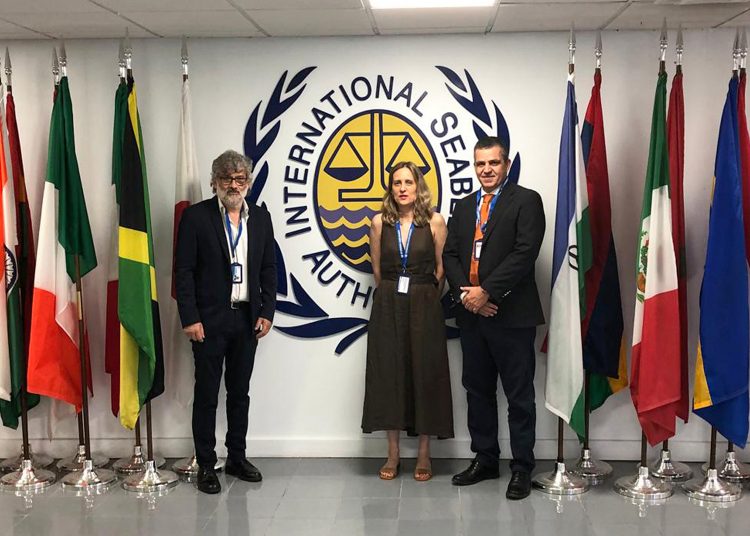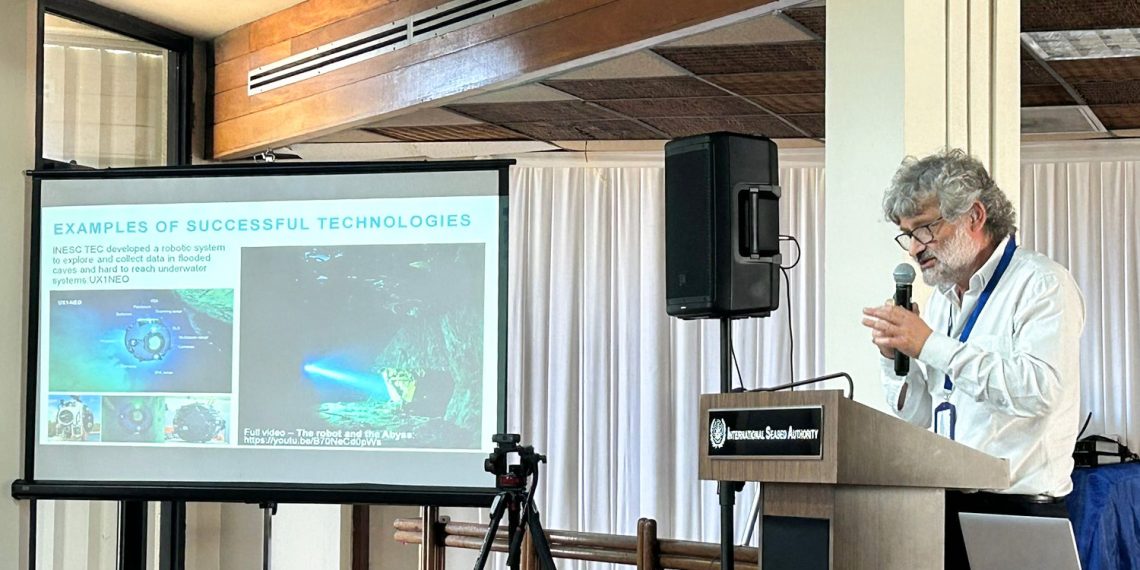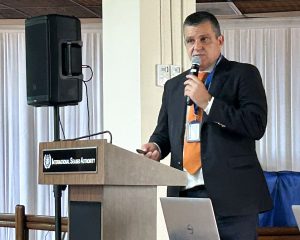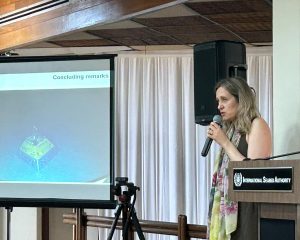What is the importance of monitoring seabed exploration for the sustainability of the oceans? How is the sustainability of human activities on Earth closely associated with the global transfer of knowledge and technology? These and many other questions were at the centre of a high-level event promoted by the Portuguese Government and co-organised by INESC TEC and the University of Évora, held at the headquarters of the International Seabed Authority (ISA) in Kingston, Jamaica.
As part of the TRIDENT project – led by INESC TEC and dedicated to the development of technologies and processes to monitor deep-sea impact – the team presented a series of talks under the theme “Innovative Technologies and Monitoring Systems to Support Ocean Policies and Data-Driven Regulation Development.”
The session featured technical contributions from Eduardo Silva, Principal Investigator of the TRIDENT project, Betina Neves, project manager, and Pedro Madureira, professor at the University of Évora and former member of the ISA’s Legal and Technical Commission.
Additional insights were provided by Maria Mendes, Legal Adviser to Portugal’s Permanent Mission to the UN, and Ulrich Schwarz-Schampera, Programme Management Officer for Mining Geology at the ISA.
In a year when Portugal formally regained a seat on the ISA Council – for the first time since 2008 – the event highlighted the country’s “active role in the defence and protection of the marine environment and in knowledge transfer,” explained Pedro Madureira. According to him, “the event fostered discussion about marine environmental monitoring systems and early-warning mechanisms for potential impact of future exploration activities, supporting decision-making and ecosystem protection.”
“It was an opportunity for INESC TEC to present the modular monitoring system that TRIDENT aims to develop, which can be applied to the future exploration of different types of mineral resources already identified in the Area (seabed area under ISA jurisdiction), and in various geomorphic contexts: polymetallic nodules on abyssal plains, polymetallic sulphides near mid-ocean ridges, and cobalt-rich iron–manganese crusts on seamounts,” explained the researcher, who is also a professor at the University of Évora.
According to Betina Neves, “TRIDENT is a unique project for integrating deep-sea technologies and operational philosophy, while combining innovative technological elements and sensors – also focusing on autonomous robotic architecture, featuring communication, navigation, and dynamic positioning capabilities.”
She added that these solutions are designed to improve data access while also “overcoming costly assets like support vessels, working-class Remotely Operated Vehicles [ROVs], and permanent crews.”
In this sense, TRIDENT aims to “reduce environmental monitoring costs, making such operations financially viable while ensuring a longer presence in the marine environments, operating continuously, and providing transparent data access to official and supervisory entities.”
“Exploration activities should serve the benefit of humankind”
According to Pedro Madureira, “continuous monitoring of the marine environments is the only way to assess and ideally prevent any harmful impact that potential future mineral resource exploration might have on ecosystems.” He stressed that “the Area and the mineral resources are regarded as the common heritage of humankind.”
“Exploration activities must serve the benefit of all humanity – by providing metals for society and ensuring the fair distribution of the financial, economic, and other benefits associated with said activities,” he reinforced.
However, the current “state of the art” in these operations remains “relatively primitive,” noted Eduardo Silva, adding that “while there have been numerous innovations in technologies for deep-sea data collection, the development of continuous monitoring systems – not only in the deepest zones but also throughout the water column – is still at an early stage.”
He further explained that “costs remain high, with excessive dependence on support vessels used for deploying traditional marine technologies, which are energy-limited and restrict long-term, large-scale data collection.”

Ocean sustainability begins on land
Beyond presenting the project and advances in monitoring and impact assessment systems, the event also emphasised the importance of knowledge and technology transfer to developing countries.
According to Eduardo Silva, “capacity-building and technology transfer to less developed countries are the foundation for global harmonisation of capabilities – enabling all nations to access natural resources and new construction technologies.”
He added that these actions, particularly within the Global South, are about “equipping countries with the tools to access the world’s resources equitably.”
“We can only achieve a fairer world when more developed nations actively cooperate with and support developing states and regions,” said the INESC TEC researcher and Scientific Coordinator of INESCTEC.OCEAN.
But how can ocean research tools be shared without compromising the sustainability of our seas? According to Eduardo Silva, “the answer lies on land.”
“Today, people often look to the oceans as the solution, as if enclosing them in a glass dome would ensure global sustainability. Nothing could be further from the truth,” he stated. “The sustainability of the oceans must be studied as part of Earth’s overall sustainability. The future of our oceans will only be sustainable if the planet embraces an integrated sustainable vision.”
The researchers mentioned in this news piece are associated with INESC TEC, IPP-ISEP and the University of Évora.




 News, current topics, curiosities and so much more about INESC TEC and its community!
News, current topics, curiosities and so much more about INESC TEC and its community!